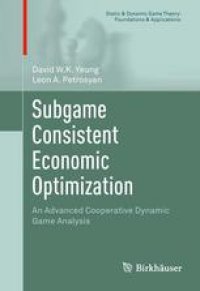
Ebook: Subgame Consistent Economic Optimization: An Advanced Cooperative Dynamic Game Analysis
- Tags: Game Theory Economics Social and Behav. Sciences, Game Theory/Mathematical Methods, Optimization, Applications of Mathematics
- Series: Static & Dynamic Game Theory: Foundations & Applications
- Year: 2012
- Publisher: Birkhäuser Basel
- Edition: 1
- Language: English
- pdf
Various imperfections in existing market systems prevent the free market from serving as a truly efficient allocation mechanism, but optimization of economic activities provides an effective remedial measure. Cooperative optimization claims that socially optimal and individually rational solutions to decision problems involving strategic action over time exist. To ensure that cooperation will last throughout the agreement period, however, the stringent condition of subgame consistency is required.
This textbook presents a study of subgame consistent economic optimization, developing game-theoretic optimization techniques to establish the foundation for an effective policy menu to tackle the suboptimal behavior that the conventional market mechanism fails to resolve.
The prevalence of imperfect structures, externalities, and imperfect information in existing market systems prevents the market from serving as an efficient mechanism for resource allocation. In the presence of such failures, optimization of economic activities provides an effective remedial measure. Cooperative optimization suggests the possibility of socially optimal and individually rational solutions to decision problems involving strategic action over time; however, to guarantee that cooperation will last throughout the agreement period, the stringent condition of subgame consistency is required.
This textbook presents a treatise on subgame consistent economic optimization, developing game-theoretic optimization techniques to establish the foundation for an effective policy menu to tackle sub-optimal circumstances that the conventional market mechanism fails to resolve. Topics covered include:
* dynamic optimization;
* group optimality and individual rationality;
* time (optimal-trajectory-subgame) consistent economic optimization;
* dynamic economic optimization under uncertainty and subgame consistency;
* dynamically stable joint ventures;
* collaborative environmental management;
* discrete-time subgame consistent economic optimization.
This is the first book to thoroughly address the topic of subgame consistent economic optimization. It will be of particular interest as a research reference for game theorists, economists, mathematicians, policy makers, and corporate planners. With ample problems and exercises, it is also a useful text for graduate students in game theory.
The prevalence of imperfect structures, externalities, and imperfect information in existing market systems prevents the market from serving as an efficient mechanism for resource allocation. In the presence of such failures, optimization of economic activities provides an effective remedial measure. Cooperative optimization suggests the possibility of socially optimal and individually rational solutions to decision problems involving strategic action over time; however, to guarantee that cooperation will last throughout the agreement period, the stringent condition of subgame consistency is required.
This textbook presents a treatise on subgame consistent economic optimization, developing game-theoretic optimization techniques to establish the foundation for an effective policy menu to tackle sub-optimal circumstances that the conventional market mechanism fails to resolve. Topics covered include:
* dynamic optimization;
* group optimality and individual rationality;
* time (optimal-trajectory-subgame) consistent economic optimization;
* dynamic economic optimization under uncertainty and subgame consistency;
* dynamically stable joint ventures;
* collaborative environmental management;
* discrete-time subgame consistent economic optimization.
This is the first book to thoroughly address the topic of subgame consistent economic optimization. It will be of particular interest as a research reference for game theorists, economists, mathematicians, policy makers, and corporate planners. With ample problems and exercises, it is also a useful text for graduate students in game theory.
Content:
Front Matter....Pages I-XVI
Introduction....Pages 1-5
Dynamic Strategic Interactions in Economic Systems....Pages 7-45
Dynamic Economic Optimization: Group Optimality and Individual Rationality....Pages 47-76
Time Consistency and Optimal-Trajectory-Subgame Consistent Economic Optimization....Pages 77-110
Dynamically Stable Cost-Saving Joint Venture....Pages 111-146
Collaborative Environmental Management....Pages 147-175
Dynamically Stable Dormant Firm Cartel....Pages 177-202
Subgame Consistent Economic Optimization Under Uncertainty....Pages 203-237
Cost-Saving Joint Venture Under Uncertainty....Pages 239-270
Collaborative Environmental Management Under Uncertainty....Pages 271-293
Subgame Consistent Dormant Firm Cartel....Pages 295-321
Dynamic Consistency in Discrete-Time Cooperative Games....Pages 323-342
Discrete-Time Cooperative Games Under Uncertainty....Pages 343-365
Back Matter....Pages 367-395
The prevalence of imperfect structures, externalities, and imperfect information in existing market systems prevents the market from serving as an efficient mechanism for resource allocation. In the presence of such failures, optimization of economic activities provides an effective remedial measure. Cooperative optimization suggests the possibility of socially optimal and individually rational solutions to decision problems involving strategic action over time; however, to guarantee that cooperation will last throughout the agreement period, the stringent condition of subgame consistency is required.
This textbook presents a treatise on subgame consistent economic optimization, developing game-theoretic optimization techniques to establish the foundation for an effective policy menu to tackle sub-optimal circumstances that the conventional market mechanism fails to resolve. Topics covered include:
* dynamic optimization;
* group optimality and individual rationality;
* time (optimal-trajectory-subgame) consistent economic optimization;
* dynamic economic optimization under uncertainty and subgame consistency;
* dynamically stable joint ventures;
* collaborative environmental management;
* discrete-time subgame consistent economic optimization.
This is the first book to thoroughly address the topic of subgame consistent economic optimization. It will be of particular interest as a research reference for game theorists, economists, mathematicians, policy makers, and corporate planners. With ample problems and exercises, it is also a useful text for graduate students in game theory.
Content:
Front Matter....Pages I-XVI
Introduction....Pages 1-5
Dynamic Strategic Interactions in Economic Systems....Pages 7-45
Dynamic Economic Optimization: Group Optimality and Individual Rationality....Pages 47-76
Time Consistency and Optimal-Trajectory-Subgame Consistent Economic Optimization....Pages 77-110
Dynamically Stable Cost-Saving Joint Venture....Pages 111-146
Collaborative Environmental Management....Pages 147-175
Dynamically Stable Dormant Firm Cartel....Pages 177-202
Subgame Consistent Economic Optimization Under Uncertainty....Pages 203-237
Cost-Saving Joint Venture Under Uncertainty....Pages 239-270
Collaborative Environmental Management Under Uncertainty....Pages 271-293
Subgame Consistent Dormant Firm Cartel....Pages 295-321
Dynamic Consistency in Discrete-Time Cooperative Games....Pages 323-342
Discrete-Time Cooperative Games Under Uncertainty....Pages 343-365
Back Matter....Pages 367-395
....